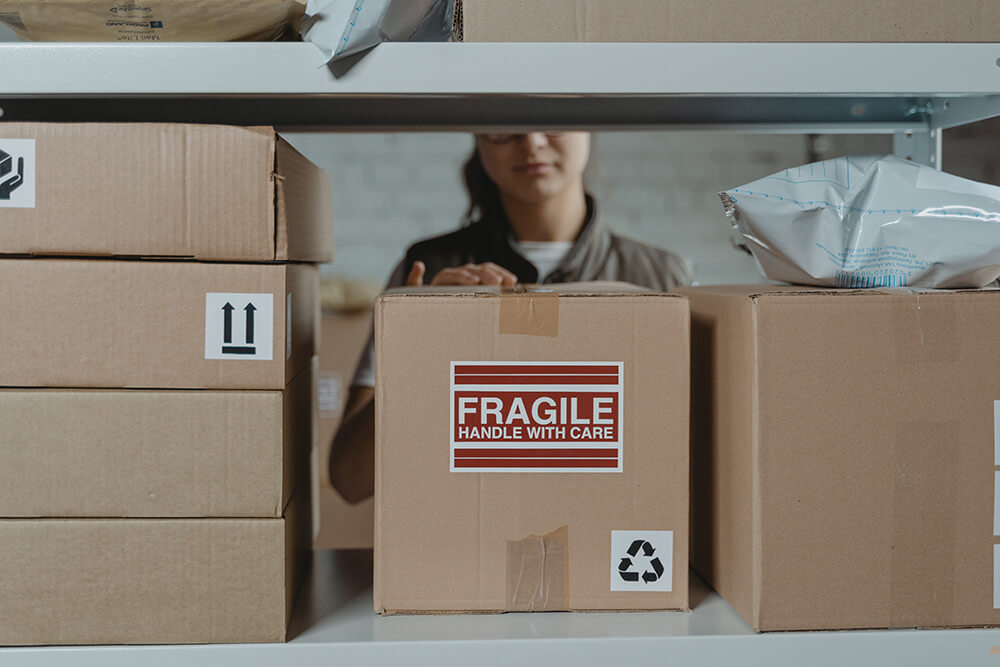Is your ecommerce business looking to expand beyond its borders?
From international conference calling to opening up departments overseas, more and more businesses are operating on a global level.
International shipping allows you to reach a global customer base, opening up endless new possibilities for success. At a snapshot, In 2022, US ecommerce sales hit USD $774.7 billion, and in the UK, ecommerce gross merchandise is projected to increase to US 413.4 billion by 2026.
By tapping into these new markets abroad, your business can make a name for itself internationally and work towards the exponential growth only a global audience can provide.
Around 80% of all goods are carried by sea—meaning that international shipping is truly the backbone of world trade. Joining the global marketplace is an exciting step for any business!
However, international shipping can be complicated, especially if you aren’t prepared. Before you dive in, you need to know what to expect. Here are six things about international shipping that you should prepare for.
1. Longer delivery times
Though your ecommerce business may pride itself on speed when it comes to domestic shipping, you may find it harder to get speed of delivery on a larger scale—especially when you start fulfilling overseas online shopping orders.
Even when everything goes smoothly, transporting products overseas takes time. Then, factor in the potential for things to go wrong—hold ups at customs, incorrect paperwork, unexpected extra charges, and so on.
Preparing Your Business For International Shipping 2023: The Ultimate Checklist.
Don’t miss this opportunity to grow and innovate in your business. Prepare for international success now with our guide.

Using a global parcel tracking service takes some of the guesswork out of international shipping. You and your customers will both benefit from knowing where their package is at each stage of its journey. This lets your customers know that their order is in safe hands and that they can trust you to deliver on expectations. It’s easier to be patient when you can see where the package you’re waiting on is.
Aside from this, you can keep delays to a minimum by knowing what to expect. Read on to find out about some things you should prepare for, so you’ll be ready to face problems head-on.
2. Language barriers
Communication is everything—both internally and when connecting with customers.
As much as language connects us, it can also be a source of miscommunication. You know what your business wants to communicate with your customers, but the message might get scrambled along the way—much like a conversation over a video chat platform with poor signal.
You want to ensure that your brand message resonates in every country where you do business and that nothing gets lost in translation.
Don’t be afraid to start small. Focus on countries that share your native language before going further afield. Shipping from New Zealand to Australia, for example, might be a good place to start. Once successful, you can always scale up.
When you begin working in multiple languages, be sure to be thorough, and consult people who are not only fluent but also have a real understanding of the culture in question. Straightforward translations don’t always give you the full picture. ‘Localisation‘ is key to engaging successfully with your target market.
Do your research, and make sure that your product and marketing ‘fit’ in the destination country.
3. Country-specific regulations and banned goods

While you may already be familiar with NZ security procedures, it’s crucial that you do your research on the destination country, or else your parcel may end up stuck at customs. Worse, you may face charges for knowingly or unknowingly breaking the rules.
First, check to see if your products can be imported into a given region. Some countries might impose tariffs, limit supply, or even prohibit your product(s) entirely.
Second, check if your products are listed as ‘dangerous goods’ in the country you’re shipping to. A ‘dangerous good’ is one which may cause harm during transit—so special rules often apply. You can usually find this kind of information on a country’s government website.
Remember, ingredients or components of your product may be on these lists, even if the product as a whole is not. You may be surprised at some of the unexpected items which are considered dangerous goods.
If your product is considered dangerous, be sure to declare it. You may face serious consequences if you are not transparent about what you are shipping. Don’t try to be clever and find a shortcut—openness is key to ethical trading.
Doing this research ahead of time will ensure a smooth delivery, and no surprise disasters!
4. Products being damaged in transit
It’s always disappointing as a consumer to unbox an order and find the product damaged upon arrival. Unfortunately, when you’re shipping fragile products overseas, this is always a risk. So, how can you be prepared?
Investing in sturdy product packaging is without doubt a good start. Include protective material, and reinforce the corners of the box with tape. As well as being a great way to improve customer experience, well-thought-out packaging increases the likelihood of the product reaching its destination in one piece. And, increases the likelihood of repeat business!
If you’re selling goods with a higher price point, it might also be worth considering shipping insurance. If the order being shipped is valued over $200, insurance is recommended as it provides peace of mind to both you and your customer.

5. You may face extra charges at customs
Unplanned duties, taxes, and extra costs are perhaps the most annoying aspect of international shipping. It is especially unfortunate when your customers need to pay these additional costs, if they were not previously warned. Whether this is your fault or not, it will impact their perception of your brand.
The best way to avoid this is to know precisely which documents are needed for every shipment. If they are all present and filled out correctly, the reviewing process at the customs office should go smoothly.
Make sure you use the correct paperwork to declare your goods, so they don’t get delayed. This means filling out a commercial invoice and a Air Waybill on our online portal.
A commercial invoice is legal evidence of a sale transaction between the buyer and seller. It also contains information regarding the classification of products. An Air Waybill is similar, but it includes the instructions given to the carrier and proves the contract of carriage.
We make International Shipping easy for you
International Post and Courier services so you can import and export your products all over the world.

Using online templates as a guide and filling these out correctly will allow your parcels to pass more quickly through customs.
6. Potential for returns
As frustrating as it may be when you’ve done everything right, there’s always a possibility that the customer will be dissatisfied with their purchase and opt to return it. Check whether the international shipping company you’re using facilitates reverse shipments. You need to delegate this task to other operators if they do not. Make sure you have a planned procedure for this situation before it happens.
Conclusion
As daunting as the process can seem, international shipping really comes down to being prepared. Prepare, package, and declare all of your items properly before sending them off.
If all of the paperwork is in place, the process should go smoothly. Being aware of the types of problems which commonly arise in international shipping means you’ll be able to plan for appropriate mitigation procedures.
With this knowledge and preparation, you’re ready to start expanding your ecommerce brand internationally. Read more about other logistical factors to consider in our article The Ultimate Guide To Sending Dangerous Goods.
 8 min read
8 min read






